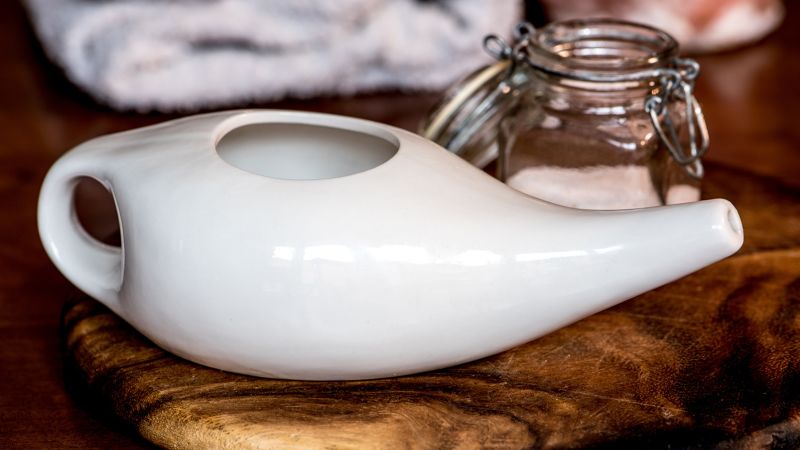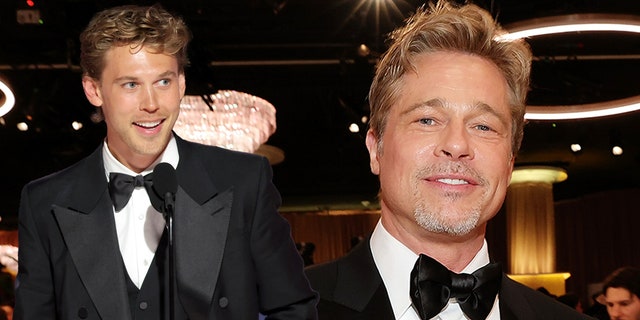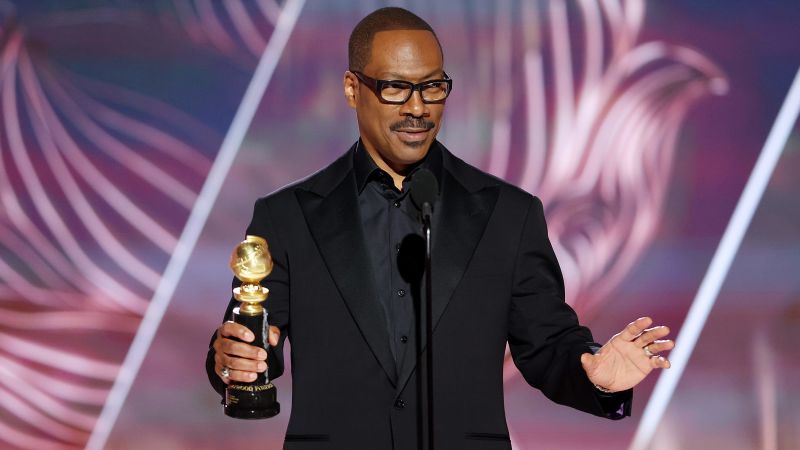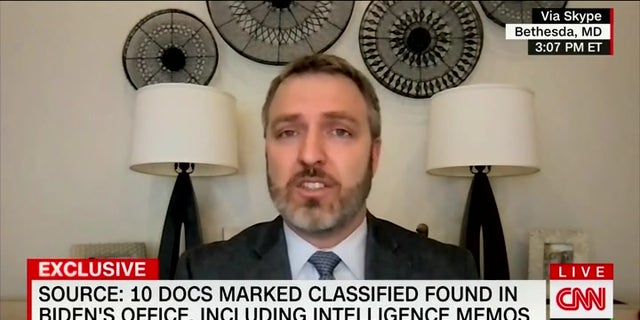Steven Spielberg took home the best motion picture – drama award for “The Fabelmans,” and also earned the best director trophy at the 80th annual Golden Globes Tuesday night.
Austin Butler praised Brad Pitt, Denzel Washington and Elvis Presley as he picked up his first Golden Globe award for best actor in a drama.
Standing in awe on stage after winning for his starring role in Baz Luhrmann’s 2022 biopic “Elvis,” he said, “I’m in this room full of my heroes. Brad, I love you.”
He also thanked director Quentin Tarantino, saying, “Quentin, I printed out the Pulp Fiction script when I was 12.”
Pitt, who skipped out on the red carpet, was nominated for best supporting actor in “Babylon.”
He lost out on the award to “Everything Everywhere All at Once” actor Ke Huy Quan,” who was the first actor of Asian descent in 40 years to win in the category.
GOLDEN GLOBES 2023 RED CARPET FASHION
Austin Butler, left, thanked his heroes while accepting his first Golden Globe award.
(Getty Images)
Comedian Jerrod Carmichael talked Hollywood Foreign Press Association controversies during his opening monologue.
“I’m here ’cause I’m Black,” Carmichael said. “I won’t say they were a racist organization, but they didn’t have a single Black member until George Floyd died, so do with that information what you will.”
“Like, one minute, you’re making mint tea at home; the next, you’re invited to be the Black face of an embattled White organization. Life really comes at you fast,” he joked.
GOLDEN GLOBE HOST CANDIDLY ADDRESSES CONTROVERSY: ‘I’M HERE ‘CAUSE I’M BLACK’
He laughed, “I’m unfireable.”
Eddie Murphy made light of another controversy from last year’s awards season as he accepted the Cecil B. DeMille award.
“There is a definitive blueprint that you can follow to achieve success, prosperity, longevity and peace of mind,” he told the “up-and-coming dreamers” in the audience. “Just do these three things – Pay your taxes, mind your business, and keep Will Smith’s wife’s name out your f—ing mouth.”
Murphy was referring to the now infamous moment Smith slapped Chris Rock after the comedian made a joke about Jada Pinkett Smith’s shaved head.
Eddie Murphy brought out his best Will Smith joke at the Golden Globes.
(Rich Polk)
Jerrod Carmichael hosted Golden Globes Tuesday at Beverly Hills Hilton.
(Rich Polk)
Jennifer Coolidge joked she was at the Golden Globes to present an Oscar.
(Rich Polk)
Angela Bassett shows off her Golden Globe Award for “Black Panther: Wakanda Forever.”
(Frazer Harrison)
Angela Bassett won a Golden Globe for “Black Panther: Wakanda Forever,” marking the first major award for a Marvel film actor.
Jennifer Coolidge remembered getting a call about being asked to present at the Golden Globes and initially saying yes, but then having a “complete anxiety attack” and rescinding her offer.
She then thought about having to walk from “behind the curtain without breaking my skull.”
One of the Globes producers said, “Jennifer, then why don’t you just wear a pair of Crocs?”
GOLDEN GLOBES: ‘YELLOWSTONE’ STAR KEVIN COSTNER SAYS HE HAD TO MISS CEREMONY DUE TO FLOODING AFTER LA STORMS
Standing on stage wearing a stunning black lace gown, she remembered, “Are you kidding me? With my Dolce & Gabbana dress? All of those Italians would lose their minds,” Coolidge said.
The “White Lotus” star joked, “And the Oscar goes to,” before announcing the winner.
Tyler James Williams from “Abbott Elementary” won the Golden Globe for supporting actor – TV series. He thanked the cast and crew of the show, created by Quinta Brunson. Eddie Murphy was pictured giving a standing ovation to the first-time Golden Globe winner.
“I truly, truly appreciate this, and I pray that this is a win for Gregory Eddie (his character on “Abbott”) and for his story and for stories like his … that we may understand that his story is just as important as all of the other stories that have to be told out here,” Williams said.
Jeremy Allen White won best actor in a television series for his role in “Bear” and declared, “I love acting,” as he thanked the cast and crew for his award.
“Rihanna, I love you and I dressed up as you for Halloween. I had to take my moment,” Niecy Nash told the “Umbrella” singer from the stage before announcing Quinta Brunson as the winner for best actress in a television series.
Tyler James Williams won best supporting actor – television series for “Abbott Elementary.”
(Frederic J. Brown)
“Abbott Elementary” creator Quinta Brunson rocked a Christian Siriano gown for the ceremony where she won best television actress – Musical/Comedy Series.
(Rich Polk)
Rihanna and A$AP Rocky cuddle up at the Golden Globe Awards.
(Christopher Polk)
Steven Spielberg accepts best director award for “The Fabelmans.”
(Rich Polk)
The “Abbott Elementary” star thanked her husband, her “wonderful, wonderful, wonderful cast,” and laughed as her group chats full of family and friends kept her phone buzzing.
“Abbott” later picked up the best TV series – musical or comedy Golden Globe award. Brunson thanked Henry Winkler, Bob Odenkirk and Seth Rogen for inspiring her.
“We made this show because we love comedy, and we love TV,” Quinta said.
The star-studded event returned for the first time since 2021 after a controversy involving the Hollywood Foreign Press Association (HFPA).
GOLDEN GLOBES 2023 NOMINEES, CONTROVERSIES: WHAT TO KNOW
At the time, the HFPA came under fire after a Los Angeles Times investigation revealed ethical lapses and a stunning lack of diversity — there was not a single Black journalist in the 87-person group. Studios and PR firms threatened to boycott. Tom Cruise even returned his three Golden Globes, while other A-listers condemned the group on social media.
Later in the evening, Coolidge was back to win her first Globe for “The White Lotus.” She put the award down on the stage and said, “I don’t work out, you know. I can’t hold it that long.”
Coolidge praised “Lotus” creator Mike White for giving her “hope” in her career during her speech, which was heavily bleeped. “Even if this is the end, because you did kill me off … it doesn’t matter. You changed my life in a million different ways. My neighbors are speaking to me, things like that. I was never invited to one party on my hill and now everyone’s inviting me.”
White later took his own moment on stage to thank Coolidge while accepting the Golden Globe for best limited anthology series or TV movie. He joked he wanted to give his speech in Italian, but was too drunk.
“I know you all passed on this show,” he said while looking into the audience and laughing. “Very gratifying moment.”
Michelle Yeoh won Golden Globe for best actress in “Everything Everywhere All at Once.”
(Rich Polk)
Sean Penn introduced Ukrainian President Volodymyr Zelenskyy at the Golden Globes Tuesday.
(Rich Polk)
Guillermo del Toro’s “Pinocchio” won for best animated film.
(Rich Polk)
Steven Spielberg won best director for “The Fabelmans,” and admitted he had been hiding the story “since he was 17 years old.”
CLICK HERE TO SIGN UP FOR THE ENTERTAINMENT NEWSLETTER
“Everything I’ve done up to this point has made me ready to finally be honest about the fact it’s not easy to be a kid, the fact that everyone sees me as a success story … but nobody really knows who we are until we’re courageous enough to tell everyone who we are, and I spent a lot of time trying to figure out when I could tell that story,” he said.
Carmichael returned from a commercial with a joke that shocked social media users.
“Alright you guys, we are back,” he said. “We are pressed for time. We are live from the hotel that killed Whitney Houston, the Beverly Hilton, so that is very exciting.”
Sean Penn raised awareness for Iranian protestors during a humanitarian speech before introducing Ukrainian president Volodymyr Zelenskyy via video at the Globes.
“There are still battles and tears ahead, but now I can definitely tell you who are the best in the previous year, it was you. The free people of the free world. Those who united around the support of the free Ukrainian people in our common struggle for freedom,” Zelenskyy said. “There will be no third World War, it is not a trilogy. Ukraine will stop the Russian aggression on our land.”
“House of the Dragon” won best drama series, and “The Banshees of Inisherin” earned the best motion picture – musical or comedy award.
CLICK HERE TO GET THE FOX NEWS APP
Tracy Wright is an entertainment writer for Fox News Digital. Send story tips to [email protected].
























